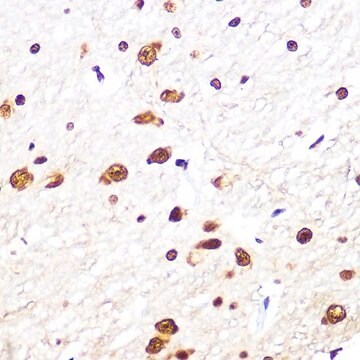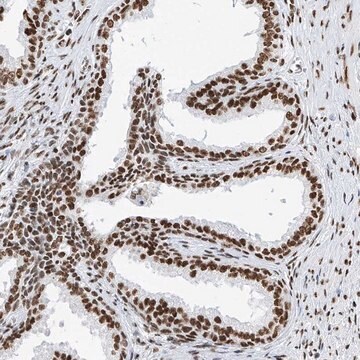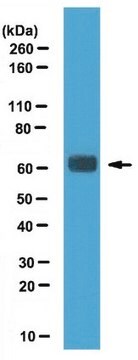MABE50
Anti-Phosphoepitope SR proteins Antibody, clone 1H4
clone 1H4, from mouse
Synonym(e):
Ser-Arg-rich proteins
About This Item
Empfohlene Produkte
Biologische Quelle
mouse
Qualitätsniveau
Antikörperform
purified immunoglobulin
Antikörper-Produkttyp
primary antibodies
Klon
1H4, monoclonal
Speziesreaktivität
rat
Speziesreaktivität (Voraussage durch Homologie)
human (based on 100% sequence homology), mouse (based on 100% sequence homology)
Methode(n)
immunocytochemistry: suitable
immunoprecipitation (IP): suitable
western blot: suitable
Isotyp
IgG1κ
Versandbedingung
wet ice
Posttranslationale Modifikation Target
unmodified
Allgemeine Beschreibung
Immunogen
Anwendung
Epigenetik & nukleäre Funktionen
RNA-Stoffwechsel & Bindungsproteine
Immunoprecipitation Analysis: A representative lot was used by an independent laboratory in IP (Buratti, E., et al. (2007).
Qualität
Western Blot Analysis: 0.025 µg/mL of this antibody detected SR proteins in 10 µg of L6 plus insulin cell lysate.
Zielbeschreibung
This antibody recognizes the family of SR proteins which consist of 75, 55, 40, 30, 20 kDa proteins.
Physikalische Form
Lagerung und Haltbarkeit
Hinweis zur Analyse
L6 plus insulin cell lysate
Sonstige Hinweise
Haftungsausschluss
Not finding the right product?
Try our Produkt-Auswahlhilfe.
Lagerklassenschlüssel
12 - Non Combustible Liquids
WGK
WGK 1
Flammpunkt (°F)
Not applicable
Flammpunkt (°C)
Not applicable
Analysenzertifikate (COA)
Suchen Sie nach Analysenzertifikate (COA), indem Sie die Lot-/Chargennummer des Produkts eingeben. Lot- und Chargennummern sind auf dem Produktetikett hinter den Wörtern ‘Lot’ oder ‘Batch’ (Lot oder Charge) zu finden.
Besitzen Sie dieses Produkt bereits?
In der Dokumentenbibliothek finden Sie die Dokumentation zu den Produkten, die Sie kürzlich erworben haben.
Unser Team von Wissenschaftlern verfügt über Erfahrung in allen Forschungsbereichen einschließlich Life Science, Materialwissenschaften, chemischer Synthese, Chromatographie, Analytik und vielen mehr..
Setzen Sie sich mit dem technischen Dienst in Verbindung.





![Digoxigenin-11-dUTP, alkalilabil =85% (HPLC), solution, pkg of 25 μL (11573152910 [1 mM]), pkg of 125 μL (11573179910 [1 mM]]])](/deepweb/assets/sigmaaldrich/product/images/352/091/ef743cea-ccd8-44f1-8f3b-dec5a1e4f5d1/640/ef743cea-ccd8-44f1-8f3b-dec5a1e4f5d1.jpg)


